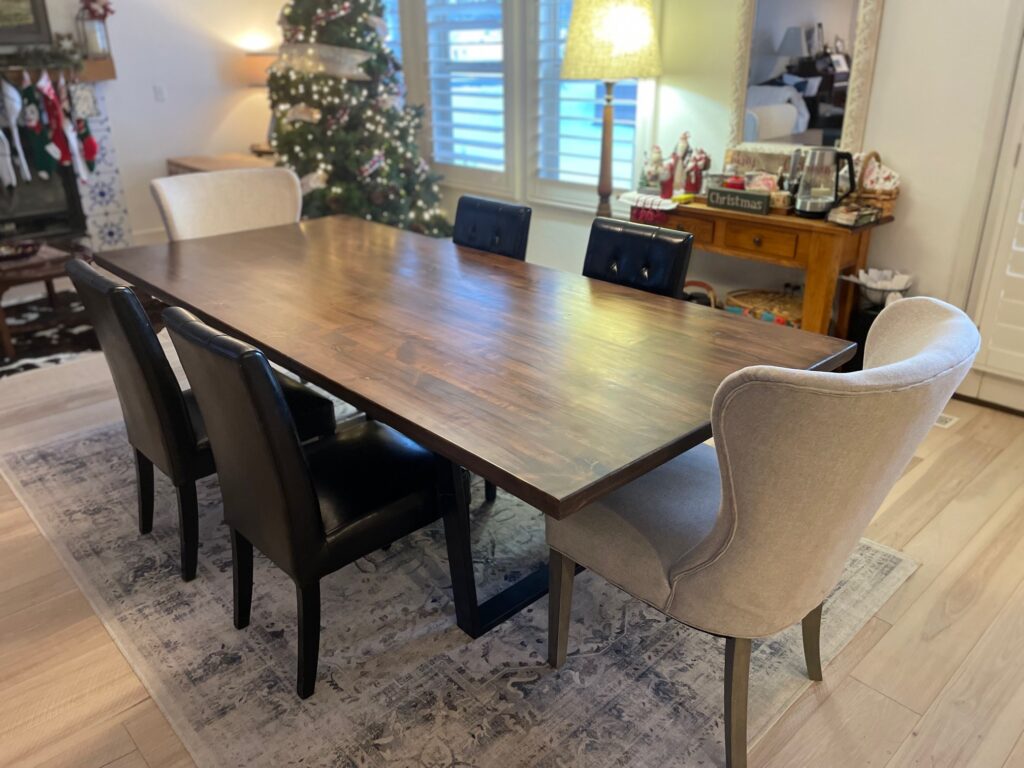When it comes to building custom wooden tables, choosing the right material is essential to achieving the desired look and feel of the final product. The type of wood chosen can impact everything from the table’s durability to its overall aesthetic. In this article, we will explore some of the different materials to consider when building custom furniture like dining room tables and the benefits of each.
- Hardwood
Hardwood is one of the most popular materials used in building custom wooden tables. It is known for its durability, strength, and natural beauty. Some common types of hardwood used in furniture-making include oak, cherry, walnut, and maple.
One of the advantages of using hardwood in building custom wooden tables is that it is long-lasting and can withstand daily wear and tear. Additionally, hardwood is available in a variety of finishes and colors, which makes it easy to match to different interior design styles.
- Softwood
Softwood is another material that can be used in building custom wooden tables. Some common types of softwood include pine, cedar, and spruce. Softwood is known for being lightweight and easy to work with, which makes it an ideal choice for beginners.
One of the benefits of using softwood in building custom wooden tables is its affordability. Softwood is typically less expensive than hardwood, which makes it a great option for those on a budget. However, softwood is not as durable as hardwood, which means it may not last as long.
- Reclaimed Wood
Reclaimed wood is a material that has gained popularity in recent years for its unique character and sustainability. It is wood that has been salvaged from old buildings, barns, and other structures and repurposed for use in furniture-making.
One of the benefits of using reclaimed wood in building custom wooden tables is its character. Reclaimed wood often has unique imperfections such as knots, nail holes, and weathered textures that give it a rustic, vintage feel. Additionally, using reclaimed wood is an environmentally friendly option as it helps to reduce waste and promote sustainability.
- Plywood
Plywood is a composite material made up of thin layers of wood glued together. It is a popular material used in building custom wooden tables because it is strong and versatile. Plywood is available in different grades, with higher grades having fewer imperfections and a smoother finish.
One of the benefits of using plywood in building custom wooden tables is its affordability. Plywood is less expensive than solid wood and can be a great option for those on a budget. Additionally, it is easy to work with and can be cut and shaped to fit specific design requirements.
- Bamboo
Bamboo is a sustainable and eco-friendly material that is becoming increasingly popular in furniture-making. It is a fast-growing grass that is easily renewable and can be harvested without causing damage to the environment.
One of the benefits of using bamboo in building custom wooden tables is its strength and durability. Bamboo is stronger than many hardwoods and is also naturally resistant to pests and moisture. Additionally, it has a unique grain pattern that can add a modern and natural touch to any space.
In conclusion, choosing the right material is an essential part of building custom furniture like dining room tables. Hardwood is a durable and versatile option that is available in a variety of finishes and colors, while softwood is a more affordable option that is easy to work with. Reclaimed wood offers unique character and sustainability, while plywood is a strong and versatile composite material. Bamboo is a sustainable and eco-friendly option that is strong and has a unique grain pattern. Each material has its own unique benefits and can be used to create custom wooden tables that match specific design requirements and preferences.
If you are ready for that custom piece, call us today! Fox In The Sawdust

